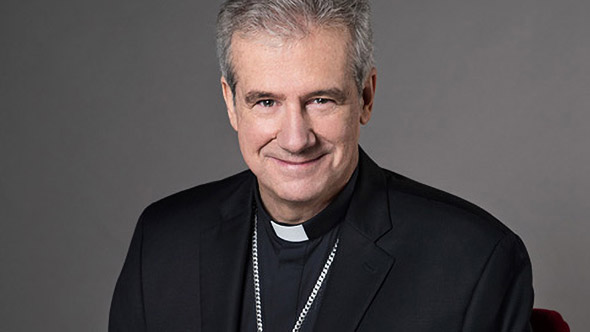Archbishop Christian Lépine’s pastoral message for the 28th World Day of the Sick

Montreal
On Wednesday, Feb. 5, 2020, Archbishop Christian Lépine delivered a pastoral message for the 28th World Day of the Sick.
“Come to me, all you that are weary and are carrying heavy burdens, and I will give you rest.” (Mt 11:28)
Dear People of God,
World Day of the Sick is an opportune moment to reflect on the meaning of life, suffering and death. In uniting ourselves with Jesus through his Passion, we are able to experience the power of his presence. In a sense, on the face of each human being, especially of those afflicted and disfigured by sickness, shines the face of Christ.
When I meet people struggling with illness, I encourage them to see this as a challenge to grow as a person and as a Christian, as a time to encounter the Lord. When we offer our suffering to Jesus Crucified, we participate in his Cross and Resurrection, in his Love, which is love to its fullest, and in the Power released by his gentleness, which comforts and strengthens the soul. Following this path leads to the gift of his Peace and guides us through the course of sickness with a responsive heart filled with generosity and concern for others.
In sickness, God continues to be present and to work in us and through us, but He also reveals himself through our family, health-care workers and those who generously accompany us along the way. When we remain present, listen to and accompany end-of-life patients; when we journey with them until their natural death; when we help to relieve their pain and to face their fears, we uphold their dignity. We enable them to follow their lifelong journey to its natural end and to make their final freely chosen act: that is, to leave this life and this world loving to the fullest, placing themselves in God’s hands and trusting in his forgiveness, offering their life to God for their family and for others. In this way, we become the face of God, a loving face which helps the sick person to become aware of God’s presence.
When a sick person says: “I am in pain; I cannot stand this anymore; I want to die,” it is upsetting, but in it, one can also hear: “I need help; I need someone’s presence.” Even when there is no possible cure, we need to believe in the power that our presence and comfort care do bring. Families, those immediately involved and society as a whole are called to help all individuals live to the natural end of their life. We must support them, affirm their inherent dignity and accompany them. This support becomes tangible when we remain present to them and actively listen, so that those who are suffering feel neither alone nor abandoned.
We need to encourage palliative care since it supports the individual and his/her family by offering a human and spiritual environment that can facilitate forgiveness and reconciliation, that despite difficulties can foster peace and hope. Jesus died both praying and loving. Palliative care, even when the patient’s awareness has decreased, provides a space to give meaning to death, an act of giving, of surrender, the transition to eternal life.
“Aid in dying” means accompanying a person toward natural death. Pre-empting death is not “aid in dying,” it’s causing death to occur. Causing the death of someone who asks to die does not ultimately respect his/her inherent freedom since causing death supresses his/her freedom to act until the natural end of one’s life.
As I wrote in a newspaper statement, published in 2014: “When we decide that some reasons justify cutting short one’s life, we act dangerously” toward the sick, their families and society. In society, we already see more requests to open the door to Medical Assistance in Dying. “We love and care for those who are vulnerable, and one day, we, ourselves, will all become vulnerable. It is important to us that we can know and trust that our family and society will not choose to hasten our death, but will rather be present and support us until the very end.” *
The moment of death is the moment to surrender totally to God and his mercy, handing over our life and memories, our weaknesses and sins, our thirst for love and its downfalls, our thirst for happiness and its disappointments. The most powerful moment in the life of Jesus was reached when he died on the Cross and, through the power of the Spirit, he offered his life to his Father and our Father, in our name, for all of humanity. Sickness, anxiety, suffering and death, through the grace of Jesus, can become paths of love, moments to surrender totally to our Creator. Through the person who is at the end of life, we touch eternity.
Let us ask our Lord Jesus Christ to grant us the gift of faith in his presence throughout moments of sickness. Let us ask our Lord Jesus Christ to help us protect life and accompany the living, with respect for the inherent dignity of all men and women.
On World Day of the Sick (February 11), I ask the Almighty Father rich in mercy, to bless you all and to grant you, your families and communities, the peace of Jesus Christ in the joy of the Holy Spirit.
Your archbishop,
† Christian Lépine
N.B.: According to your discernment, I invite all priests to consider reading this message at the end of each Sunday Mass this weekend or the next one.
*Published statement from Archbishop Christian Lépine appealing to members of the Quebec National Assembly to vote according to their conscience regarding Bill 52. Here is the link.

Comment
Comment
Add new comment